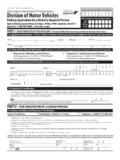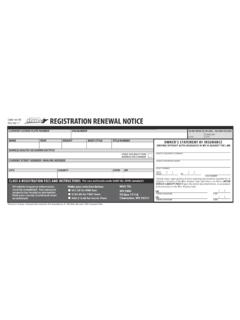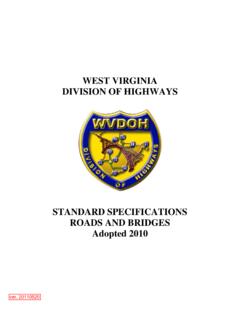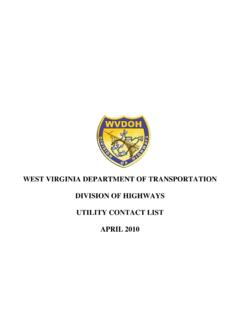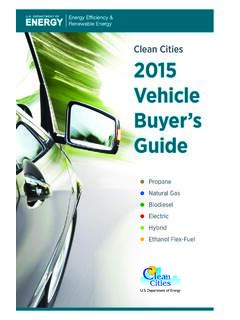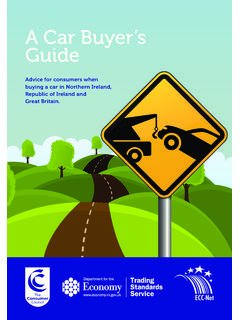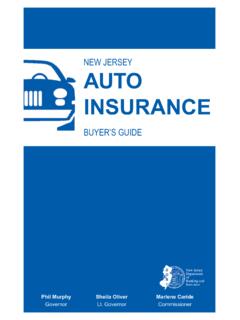Transcription of DEALER/SALESPERSONS STUDY GUIDE
1 DEALER/SALESPERSONS STUDY GUIDE WARRANTIES 1. In every contract for the sale of a vehicle, which of the following is true? A. There is an implied warranty that the vehicle is merchantable. B. The vehicle must operate properly in normal usage for a reasonable period of time. C. The vehicle must meet the contract description. D. The vehicle must be capable of passing the West Virginia motor vehicle safety inspection at the time of sale. E. All of the above. F. None of the above. Comment: Code 46A-6-107 prohibits the waiver or disclaimer of implied warranties in the sale of all consumer goods, new and used and, therefore, prohibits the sale of vehicles as is in West Virginia.
2 The definition for merchantable is found in Code 46A-6-102(c). 2. What is the minimum warranty that a dealer can offer on a used vehicle? A. The vehicle can be sold as is, without a warranty. B. The dealer will pay 25% parts, 25% labor for 30 days or 1,000 miles, whichever comes first. C. The dealer will pay 50% parts, 50% labor for 30 days or 1,000 miles, whichever comes first. D. The dealer can mark implied warranty only on the buyers GUIDE . Comment: Consumers have the basic protection afforded by the implied warranty in all sales. It is meaningless for a dealer to offer an express warranty unless it affords more protection than what the consumer already has under the implied warranty.
3 It is unlawful for a dealer to offer an express warranty that offers less protection than the consumer already has under the implied warranties such as the examples in B. and C. above. 3. Which of the following is true? A. Dealers may sell cars as is if they disclose the defects in writing. B. Dealers may sell cars as is if they are selling the vehicle on consignment for someone else. C. Dealers may never sell cars as is. D. None of the above is true. Comment: See Comment to Question 1 above. 4. Under what circumstances may a dealer be excused from the implied warranty? A. If it discloses the defects in writing. B. If the dealer sells the buyer a service contract.
4 C. If the dealer did not know about the defect at the time of sale. D. If there was still factory warranty coverage remaining on the vehicle at the time of sale. E. Never. Comment: There is no exception to the rule that the implied warranty may never be waived in the sale of consumer goods in West Virginia. 5. A dealer sells an older-model car with 150,000 miles on it for high book value. The dealer agrees to pay 25% of parts and labor for the engine and transmission for 30 days or 1,000 miles, whichever comes first. The vehicle needs a new transmission after it has been driven only 200 miles. What is the dealer s responsibility to the buyer? A. The dealer must pay 25% of the parts and labor to install a used transmission.
5 B. The dealer has the choice of paying the full cost of replacing the transmission or taking the vehicle back and giving the buyer a full refund. C. The dealer would be relieved of any responsibility if it disclosed the bad transmission in writing at the time of sale. D. None of the above is true. Comment: Questions about how far the implied warranty goes must be answered on a case-by-case basis because the law does not set concrete guidelines. However, a reasonable person may conclude that even an older-model high mileage car should not need a new transmission within the first 200 miles and, therefore, this repair is covered under the implied warranty.
6 6. A dealer sells an older-model car with 150,000 miles with a valid safety inspection sticker on it. The buyer discovers the next day that the horn and taillights do not work. What is the dealer s responsibility to the buyer? A. The dealer must pay whatever percentage of labor and parts was listed on the buyers GUIDE for the repair. B. The dealer must pay the full cost of the repairs. C. The dealer is not responsible because the vehicle had a valid inspection sticker. D. The dealer is not responsible because a vehicle that old cannot be expected to be in perfect shape. Comment: The definition of merchantable requires that the goods conform in all material respects to applicable state and federal statutes and regulations establishing standards of quality and safety of goods.
7 The applicable standards for the safety of automobiles are found in the list of items to be inspected in connection with an official motor vehicle inspection in West Virginia. If a vehicle fails inspection for any of the listed items, the vehicle was not merchantable at the time of sale and the cost of the repair must be borne by the dealer. 7. Which of the following is true? A. At the time of sale, a used vehicle does not have to have a current motor vehicle safety inspection sticker, but it must be in such condition that it meets all safety standards. B. At the time of sale, a used vehicle must have properly working brakes tires, lights, taillights, horn, rear view mirror, windshield wipers, turn sig- nals and seat belts.
8 C. At the time of sale, a used vehicle must have a working catalytic converter. D. At the time of sale, a used vehicle which was manufactured in a year requiring airbags must have working airbags. E. All of the above. F. None of the above. Comment: Dealers may sell vehicles without valid inspection stickers. When this occurs, consumers must obtain a valid inspection sticker within 3 days. The important question for the dealer is not whether the vehicle it sells has a sticker but whether the vehicles it sells in fact meet all the safety criteria if a bona fide inspection were to be conducted at the time of sale. 8. What is the dealer s responsibility to the buyer if the buyer later learns that the vehicle had significant damage in a flood before being sold to the dealer?
9 A. The dealership is not responsible because it did not know of the damage at the time it sold the vehicle. B. The dealership must cancel the sale, take back the vehicle, and refund the buyer s money if asked to refund it by the buyer. C. The dealership may refer the buyer to whoever sold the vehicle to the dealership without disclosing the damage. D. The dealership is not responsible to the buyer if the vehicle had been acquired as a trade in from another consumer. Comment: The fact that a vehicle has previously been damaged or totaled by a flood is a material fact, a fact so important that it affects the value of the vehicle or the consumer s decision whether to purchase the vehicle at all.
10 Therefore, such facts must always be disclosed by the dealer to the buyer if known prior to the sale. The dealer must also disclose such facts to the buyer when they become known after the sale. Because this is a material fact, the dealer must rescind the sale if requested by the buyer. 9. What is the dealer s responsibility to the buyer if it knows at the time of sale that a vehicle had been totaled by an insurance company, had significant damage in an accident, or was involved in a flood or other natural disaster? A. The dealer is not allowed to sell such a vehicle. B. The dealership may sell such a vehicle if it makes a full disclosure in writing of all the negative information it has about the vehicle at the time of sale.
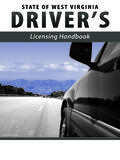
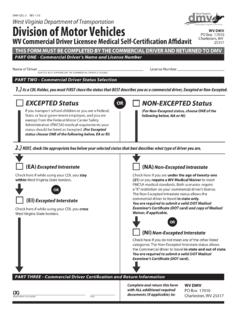
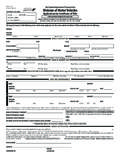
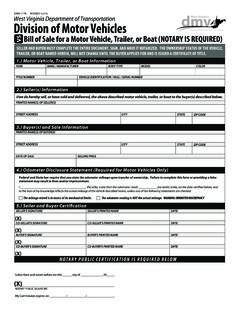
![Welcome! [transportation.wv.gov]](/cache/preview/0/e/7/9/c/d/0/2/thumb-0e79cd02df2a7ea6db8598b4ea88f5d8.jpg)
